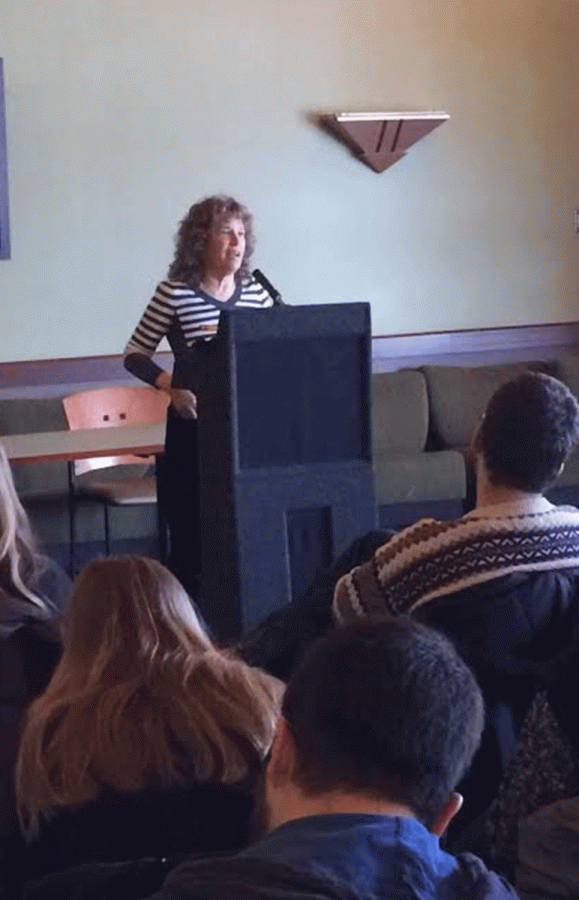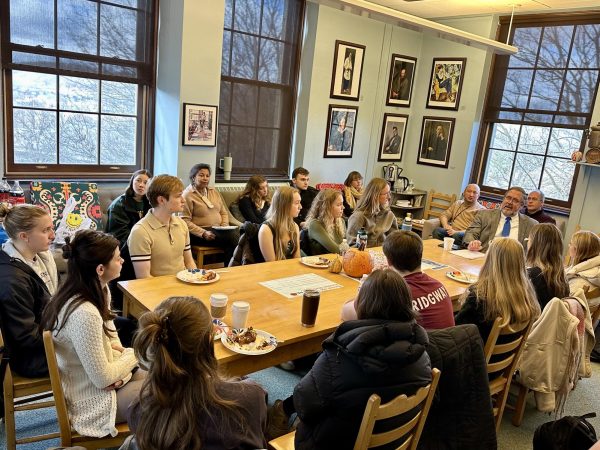Brown Bag Talks About Economic and Political Inequality in America
emocracy Matters hosted its first brown bag discussion of the year in the O’Connor Campus Center (COOP). Associate Professor of Sociology and Anthropology, Emerita, Joan Mandle delivered the lecture, titled “Economic Inequality/Political Inequality: Where are we heading?” Mandle is the Executive Director of Democracy Matters, which is a national nonpartisan organization. Democracy Matters was founded in 2001 by Colgate alumnus Adonal Foyle, a former NBA player and son to Professors Jay and Joan Mandle.
To preface her discussion of economic inequality in America, Professor Mandle explained the fundamental issues that lead to this vast disparity.
“What we’ve got is low mobility in this country; we have high inequality, we have a growing poverty rate and we have a rich class that’s very small. As you go up the economic ladder, wealth gets more and more concentrated … seven percent of the population right now owns two-thirds of the wealth. Of all the developed countries in the world, we are the most unequal economically,” Mandle said.
Mandle continued by citing the source for America’s status as the most economically unequal developed nation in the world.
“The developed world is growing more unequal internally, but the United States is much worse, largely because we do not have government programs which compensate for the stagnant wages and the broken economy,” Mandle said.
The rest of the discussion focused on the political implications of economic inequality. The growth of inequality in the economic system has led to inequality in the political system, particularly regarding the concentration of funding for campaigns and outside expenditures by politicians.
“Most people don’t understand the link between the political and the economic. As we’re getting more unequal, we are getting less democratic. We are having a democracy that is less functional, largely because very wealthy people are making the decisions about who runs, who wins and what they legislate,” Mandle said. “The majority of the American people are simply not even voting if they believe that their politicians are bought and sold by the rich. They can’t do anything about it, so why bother?”
Mandle then went on to challenge Colgate students to change this system by mobilizing and making their voices heard.
“[The system] won’t change until we build a large number of active people who are standing up and speaking out about this. What I’m talking about is a social movement … voting of course is important, but it’s only the first step. What we need is an active social movement.It is going to take a long time to fight this battle, and we need to start now,” Mandle said.
One of the students who helped organize the event, first-year Andrew DeFrank, commented on its success.
“Our attendance was a lot higher than we expected. It was really wonderful to see so many people come to our discussion about political and economic inequality. We can’t wait to see those numbers duplicated at our next brown bag, when we’ll have enough brown bags for everyone in attendance!” DeFrank said.
First-year Jessica Blau attended the Brown Bag and also commented on the lecture.
“Professor Mandle’s talk showed me how intricately woven money and politics are in the electoral campaigns of the twenty-first century. This is something our generation needs to pay attention to and care about,” Blau said.






